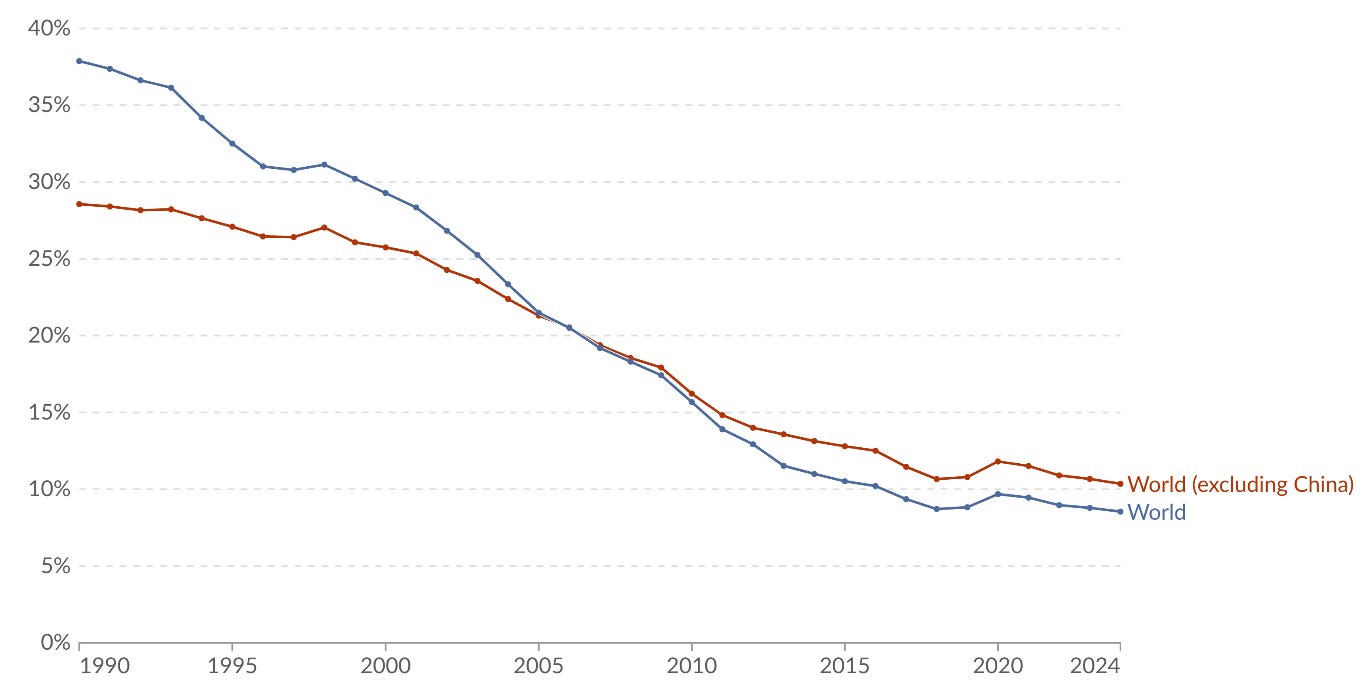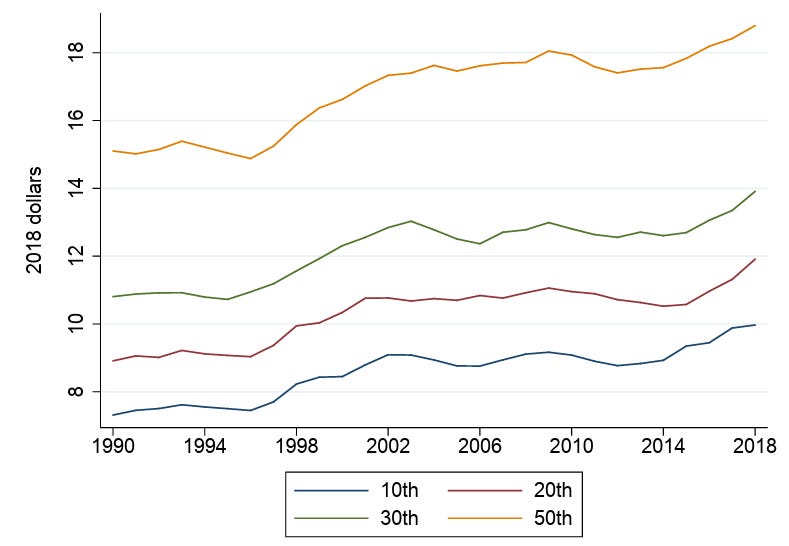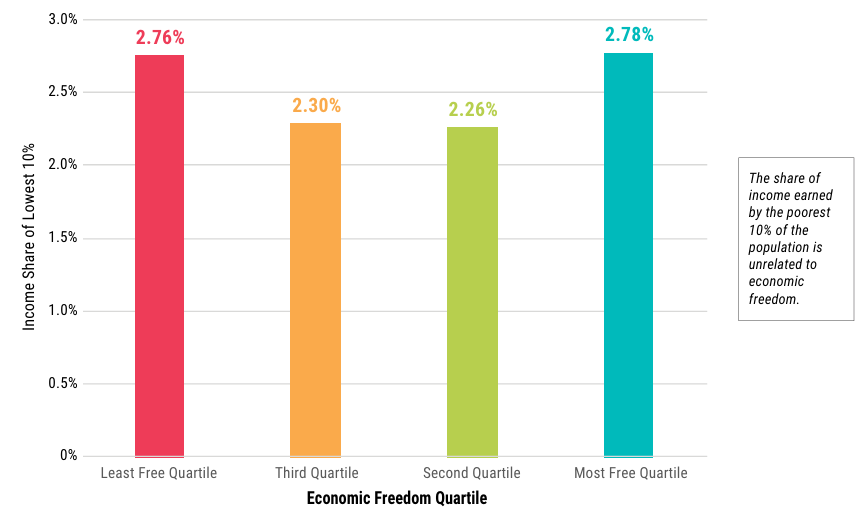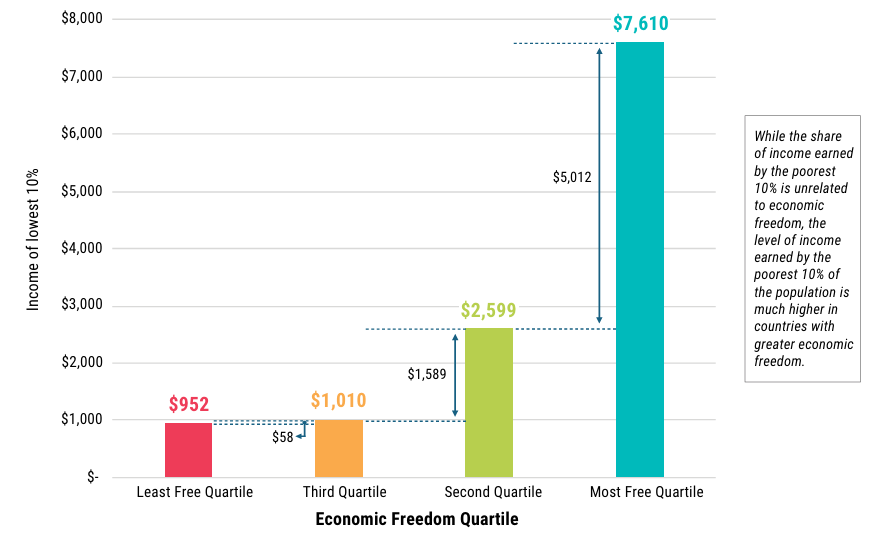The Rising Tide: How Trade Lifts All Boats
Free exchange turns scarcity into abundance for rich and poor alike.
In his book The Rational Optimist, the British science writer Matt Ridley argued that economic progress began when people began to trade. “By exchanging,” he explained, “human beings discovered ‘the division of labour,’ the specialisation of efforts and talents for mutual gain… The more human beings diversified as consumers and specialised as producers, and the more they then exchanged, the better off they have been, are and will be.” For Ridley, “exchange is to cultural evolution as sex is to biological evolution.”
The Scottish father of economics, Adam Smith, recognized the economic potential of trade when he noted that “the liberal system of free exportation and free importation” is “not only the best palliative of a dearth, but [also] the most effectual preventative of a famine.”
While economists disagree on several policy issues, trade is generally not one of them. For example, survey data suggest that 95 percent of economists agree that tariffs tend to reduce economic welfare. Another 90 percent do not think the United States should restrict outsourcing.
You’d never know that by listening to today’s political debates. While protectionism is nothing new, the recent rise in anti-trade policies is an unfortunate setback for the United States and for the world.
Far from a rigged game that exploits those at the bottom, the globalization of the market system has brought global extreme poverty to its lowest levels in human history. That is why the Turkish-American Nobel Prize–winning economist Daron Acemoglu and his coauthors have described the creation of the market system as “one of the greatest achievements of humankind.”
Share of global population living in extreme poverty, including and excluding China1

Furthermore, despite claims to the contrary, the United States’ participation in the global economy has significantly benefited American consumers and workers. Real incomes have not stagnated over the past few decades. They’ve risen, including for those at the bottom of the income distribution.
Real median personal income in the United States2

Nor has international trade hollowed out American manufacturing. While employment in the sector has declined as a result of automation and productivity gains, manufacturing output—especially output per worker—has increased.
As Michael Strain from the American Enterprise Institute observes, “America is upwardly mobile, particularly for those nearer the bottom of the income distribution. Incomes aren’t stagnant. Workers do enjoy the fruits of their labor. The argument that life hasn’t improved for typical households in decades borders on the absurd. The game is not rigged. The American Dream is not dead.”
Average real wage at percentiles of the wage distribution

In a 2020 article, I reviewed the scholarship linking trade to economic growth and poverty reduction. Overall, the empirical literature shows that trade reduces poverty predominantly through economic growth. Critics sometimes claim that growth leaves those at the bottom behind. It may improve the average, they say, but only because of large income boosts at the top.
That talking point is simply untrue. Economic freedom, including openness to trade, and growth have been shown to improve incomes across the board. A rising tide truly does lift all boats, not just the yachts of the wealthy. Growth positively touches every tier of the economic ladder. A bigger economic pie means better living standards for everyone involved, making economic growth pro–poor.
The Indian economist Arvind Panagariya has documented trade’s role in the economic success of Hong Kong, Singapore, Taiwan, South Korea, India, China, and other countries throughout Asia, Africa, and Latin America. Across more than 200 jurisdictions and five decades of data, he found a causal relation between trade and per capita income: the countries that experienced intensive growth always maintained a high and/or expanding trade-to-GDP ratio.
In a new review of the literature, Dartmouth’s Douglas Irwin found the same thing. The empirical research on trade liberalization has been “remarkably consistent” in its conclusion that open trade fosters growth in productivity and, therefore, standards of living (Tables 1 and 2). Tariffs, on the other hand, hold growth, productivity and standards of living back. Previous literature reviews have come to similar conclusions. That is why economists from all sides of the political spectrum come together on trade.
Despite the populist rhetoric about helping the American workers and consumers, those same workers and consumers end up eating the cost of tariffs in the form of higher prices. The negative effects of protectionism also have a disproportional impact on the poor, who tend to gain the most from trade.
And keep in mind that living standards aren’t just about income. Open market economies have higher adult literacy rates, longer life expectancies, lower infant mortality rates, better environmental stewardship, and greater life satisfaction than closed economies do. As Nobel Prize–winning American economist Robert Lucas wrote, “The consequences for human welfare involved in questions [about economic growth] are simply staggering. Once one starts to think about them, it is hard to think about anything else.”
Income inequality is a major criticism of an open economy, but, interestingly enough, most studies find no relation between greater economic freedom and income inequality (though the findings are somewhat mixed). It’s worth noting that concerns over income inequality are often concerns over inequality within already rich countries. When it comes to inequality, in other words, it tends to be the global rich arguing with the super global rich (and much of that concern is overblown).
But look at the bigger picture. Overall, globalization has led to both a decline in global poverty and global inequality.
Global income inequality: Gini index, 1820–20203

Income is measured per capita after pension and unemployment insurance transfers and before income and wealth taxes.
According to the 2024 “Economic Freedom of the World” report, the share of income earned by the poorest 10 percent in the most economically free countries is about the same as that of the poorest 10 percent in the least economically free countries. In other words, the income distribution—the slicing of the economic pie—looks the same across countries, no matter the level of economic freedom.
Economic freedom and income share of lowest 10 percent

But the amount of income earned by the poorest 10 percent in the most economically free countries is eighttimes that of the poorest 10 percent and slightly more than the average person in the least economically free countries. The poor’s portion of the economic pie may be the same across countries, but free countries have bigger pies.
Economic freedom and income share of lowest 10 percent

We did not redistribute our way into riches or plunder our way into prosperity. Instead, the historical shifts both institutionally and culturally in favor of a trade economy led to a radical upsurge in material well-being that the American economist Deirdre McCloskey has aptly labeled “The Great Enrichment”:
In the two centuries after 1800 the trade-tested goods and services available to the average person in Sweden or Taiwan rose by a factor of 30 or 100. Not 100 percent, understand—a mere doubling—but in its highest estimate a factor of 100, nearly 10,000 percent, and at least a factor of 30, or 2,900 percent. The Great Enrichment of the past two centuries has dwarfed any of the previous and temporary enrichments.
It’s not that we suddenly figured out how to slice up the economic pie just right. We made the pie 2,900 to 10,000 percent bigger through commercial exchange. When the pie is bigger, there’s more pie to go around. And we’re all richer for it.
Author: Walker Wright, the manager for Academic Programs at a public policy think tank in Washington, DC, and an adjunct faculty member at Brigham Young University-Idaho. His forthcoming book, In Trade We Trust: How Commerce Makes Us More Social, will be published by Bloomsbury.
Extreme poverty is defined as living below the International Poverty Line of $2.15 per day. These data are adjusted for inflation and for differences in living costs between countries. These data are expressed in international dollars at 2017 prices. The data relates to income measured after taxes and benefits, or to consumption per capita.
Shaded areas indicate US recessions.
Global inequality, as measured by the global Gini coefficient, rose from about 0.6 in 1820 to about 0.7 in 1910 and then stabilized around 0.7 between 1910 and 2020. It is still too early to say whether the decline in the global Gini coefficient observed since 2000 will continue.



"Free exchange turns scarcity into abundance for rich and poor alike "....................YES ! Good idea ,
BUT , only in a Capitalist-Free-Enterprise-Western-Culture where the INDIVIDUAL is recognised
as having personal FREEDOM , OWNERSHIP RIGHTS and WESTERN [ Judeo-Christian ] CULTURE , VALUES , WORK ETHIC and EDUCATION ....and that the 'society embraces those concepts !
Free-exchange has always existed as an option , but , historically was seldom the one of choice !
Where a person felt "entitled" to take what they wanted because they had sufficient POWER
[ Pharaohs , Kings , Barons , Generals , Popes and Abbots , Dictators= Tyrants and Pirates ! ]
then freedom and liberty were NOT a consideration ! ..........It was just TAKEN ......like slaves were !
For TRADE to occur there has to be a NEED to satisfy ..........and a high degree of TRUST.
Bartering was common and sharing [ and the consequent obligation ] would have been necessary , but until MONEY was 'invented' there was no means of conducting proper trading.
FREE TRADE is a modern concept....Tariffs are as old as the Roman Empire .....and inflation as well !
As I see the USA today with tariffs being imposed on " trading partners" , most of these are "retaliatory-tariffs" to "level the playing field" and MOST have been 'negotiated away by mutual agreements" as opposed to SANCTIONS which can be used to cripple an adversary's economy !
.
In almost every country in the modern world , economies are thriving , wealth is being created and people are enjoying , by far , the best living conditions that humans have EVER experienced ! This is largely because of NO WORLD WARS , scientific innovations in EVERY field and a "flowering of Western Culture and freedoms" and "we" have largely "tamed the bloody planet" that is so affectionately AND inaptly called "Mother Nature" [ because "she" is always devising NEW and TERRIBLE WAYS to kill us ! It's time "she" was renamed : THANATOS or MALUM ! ]
...
China has adopted a MERCANTILIST ECONOMY [ or "beggar thy neighbour" ] and it is NOT a FREE-TRADE ECONOMY [ although "left-leaning-economists' everywhere would decry that ! ].
China has surged MATERIALLY and URBANISED and created considerable wealth for itself and is now hoarding "precious metals" [ gold ,silver , palladium , Neodymium , Praseodymium , etc and Lithium and other 'battery-materials' ] and building it's military strength , and implementing it's BELT and ROAD INITIATIVE [ indebting 'weaker economies' and then , subjugating them ! ] all in it's pursuit of POWER . [ BUT POWER..........THAT IS ALL THAT "COMMUNISM" IS ABOUT ! ]
Ironically , due to "swallowing the Malthusian Idea " magnified by Paul Erlich and his doomsday book "The Population Bomb", they introduced the "one child policy" and now face a rapidly declining , and aging , population ..........so.....their "potential to wage a war" has become critical , it's got to be SOON or NOT AT ALL , because they won't have the "cannon fodder" to waste like they had in Korea !! [ Which , I suppose could earn Erlich a "BACK-HANDED" , BACK-FIRED and TOTALLY UNINTENTIONAL "Nobel Peace Prize" !!! So , some GOOD could yet emerge for him ! ].
.
I greatly appreciate YOUR DOOMSLAYER articles and ethos , so please do NOT take any of my COMMENTS personally.
I think that "saving the planet" is a 'garbage concept' and the people promulgating it , likewise , the planet has so far "eradicated" 99.99% of every life form that has ever tried to live on it !
"We" humans are always in it's "cross-hairs" but , thankfully , "our innovators and innoculators" are managing to hold it at bay for the moment !
"Catastrophic Climate Activists" on the other hand are as deluded as Malthus and Erlich and constitute a malevolence , a hypocrisy and a threat that can only assist "Mother Nature" in "her annihilist intentions". When "one" corrupts 'science' with blatant political intervention and personal aggrandisement and PURSUIT OF WEALTH then "one" should anticipate a bad outcome !
Denial of empirical evidence is delusion , but inculcating "hopelessness" and "delusion" into school children and impressionable young-adults , is diabolically malevolent !
"We" are in a warmish-interglacial in an ICE AGE......it will end ........and the ICE will return with a vengeance ....and with that phase lasting 100,000 years or so , "our" civilisation will terminate !
Advocating policies to PREVENT WARMING is suicidal as any added-extra-warmth will delay the inevitable a bit longer so that MORE PEOPLE can enjoy the life that "we" have enjoyed !
Sadly , the "TRUTH IS OUT THERE" was confined to a TV Show [ The X-Files ] and is no longer the driving force behind MUCH of science today ! Instead , it's become a question of "how can I manage to fit 'catastrophic climate change' into my new scientific research project in a way that IT WILL ATTRACT A GRANT , and assure me of a JOB and WEALTH and THE PRESTIGE I CRAVE " ???
Give me David Bellamy , the Academic , Botanist and Environmentalist over David Attenborough , the attention-seeking Broadcaster any day !!!
Cheers everyone ! Trevor.